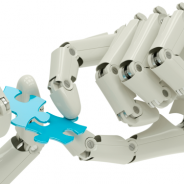Impact of automation

I am following the development of robotics and general automation closely as it is, in my opinion, the area that will make the biggest impact on society in the not so distant future. I am concerned and yet I am excited.
Starting from the basics like the iRobot hoovers, which have recently been used in an experiment in Denmark to cut down on the hours spent by social helpers looking after elderly people, all the way to autonomous cars where it seems Google is taking the lead at the moment – a revolution is happening.
It is clear to me that many companies have been using the financial crisis as a vehicle to slim down their operations by developing and using technology; moving forward they will depend more and more on automation rather than people, where possible. This phenomenon is apparent not just in traditional technology companies but also in the financial sector, where jobs are being cut in huge numbers, while the profits of the companies are surging – but that’s not all.
Autonomous driving
It is not a matter of if autonomous cars will become a reality – it is a matter of when, and I think it will be a lot sooner than we expect (certainly within 10 years). In the United States, Nevada has already approved self-driving cars for use on public roads and other states will likely follow soon.
The impact of this technology will be huge, since truck, taxi and eventually private drivers will no longer be needed. In fact, eventually it will probably be prohibited for humans to drive on public roads as they would be too unreliable. This will consequently impact a huge group of people in all countries and they will need to start thinking about how they can add value in the future or re-educate themselves for other jobs.
Robots in healthcare
Another huge industry is healthcare. There has been significant progress in this area and recently iRobot launched its first healthcare robot, which will send doctors diagnostic data in real time and interact with patients anywhere in the world.
In 2011 in Tokyo, the Toyota Motor Company launched a series of nursing and healthcare robots designed to assist humans in their everyday activities. Below is another example of healthcare robots for nursing homes; again the impact on the workforce will be massive in my opinion, and moving forward care-givers too will need to start thinking about where they fit in.
Robots in your personal life
Outside of having our houses hoovered and pools cleaned by machines – how long will it be before robot assistants are mainstream? In my opinion, we are probably just 10–15 years away from something meaningful from a usage and cost perspective but the progress is incredible and it is speeding up, which will open up entirely new industries around robots (servicing, accessories, maintenance programs, rent-a-robot, etc.).
Here is an example of how far Honda has reached as of 2012 with their famous ASIMO project (or at least what they are willing to reveal to the public):
http://www.youtube.com/watch?v=R8UeT9r4cmg
Will robots ever be human-like?
There is a lot of effort going into this – the video below is from 2011 – judge for yourself. I am sure a lot has happened since then and that a lot will happen in the years to come…
Can humans compete with robots?
There is no doubt that there are certain jobs that machines are just better at than human beings – in the past such tasks were mainly calculating and working in certain production facilities. Considering how fast technology is developing now, just look at a standard smartphone today versus 5 or 10 years ago – expectations are high and the ability of technology is getting more and more impressive by the day.
I am convinced that a computer will be a much, much better driver than the average driver and also a far more comforting and 24/7 reliable healthcare worker in many circumstances – so where does that leave the many people in those traditional service industries and what will it do to our economy?
One thing is for sure – the world is evolving faster than ever (in some areas at least) and we are up for some big changes, so it is time to start thinking about where we fit in from a work perspective as human beings in the next few decades.
